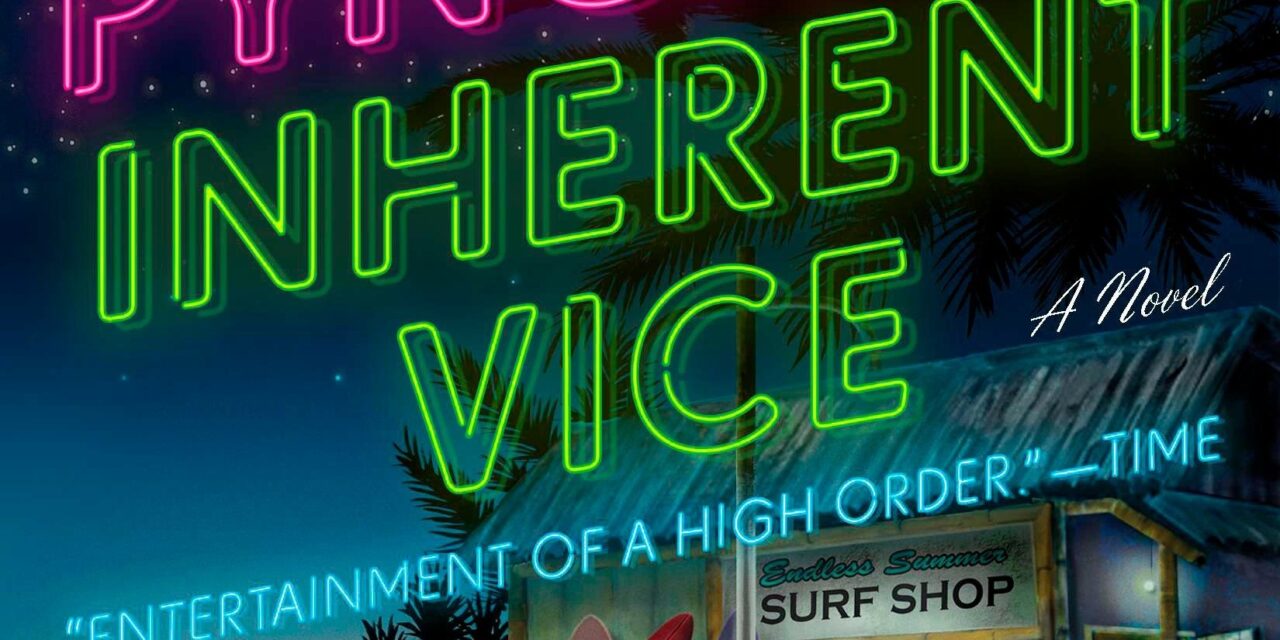Inherent Vice By Thomas Pynchon. Penguin Press. $27.95.
Reviewed by Alex Kline
Thomas Pynchon is one of America’s most celebrated writers, having won the National Book Award for Gravity’s Rainbow in 1974, and various encomia before and since. His point of view has always been PC (as in pro-cannabis), and he has had mischievous fun toying with the press as a “recluse” —which he defined as “a code word generated by journalists… meaning, ‘doesn’t like to talk to reporters.'”
Pynchon’s new novel is set in Los Angeles in the 1970s, the L.A. of Charlie Manson, Bob Denver, Lawrence Welk and Efrem Zimbalist, Jr. The protagonist, Doc Sportello, is a private investigator who frequently and casually fires up spliffs of potent weed and occasionally drops acid as he goes about his work.
Doc is visited by an ex-flame, Shasta Fay Hepworth, currently embroiled in an affair with real-estate tycoon Mickey Wolfmann. She tells Doc that Wolfmann’s wife Sloane is in cahoots with her own lover, Riggs Warbling, in a plot to separate Wolfmann from his considerable fortune and get him out of the way. Following his nose to one of Wolfmann’s housing developments, Doc is cold-cocked, comes to, and finds Glen Charlock, one of Wolfmann’s bodyguards, face down dead and riddled with bullets.
More adventures follow, involving a sinister Asian syndicate, a ship called the “Golden Fang” and a big Swedish cop named Bjorn who memorably ridicules Doc for his hippie ways while implying he could make a perfectly good fall guy for Charlock’s murder. How the title relates to the plot is unclear —”Inherent Vice” is a term from maritime law that refers to goods shipped without disclosure of an inherent fragility or defect that absolves the insurer from liability— and so is the plot itself. But clarity of exposition is not what has won Pynchon so many admirers —it’s the scintillating riffs. Here’s how he describes his PI driving to conduct an interview:
“Doc took the freeway out. The eastbound lanes teemed with VW buses in jittering paisleys, primer-coated street hemis, woodies of authentic Dearborn pine, TV-star piloted Porsches, Cadillacs carrying dentists to extramarital trysts, windowless vans with lurid teen dramas in progress inside, pickups with mattresses full of country cousins from San Joaquin, all wheeling along together down into these great horizonless fields of housing, under the power transmission lines, everybody’s radios lasing on the same couple of AM stations, under a sky like watered milk, and the white bombardment of a sun smogged into only a smear of probability, out in whose light you began to wonder if anything you’d call psychedelic could ever happen, or if —bummer!— all this time it had really been going on up north.”
However reclusive he may be, Pynchon has done a couple of stints doing voice work for The Simpsons. In one, Marge Simpson has turned novelist, and seeks a blurb from the Great Author about her book, “The Harpooned Heart.” Standing in front of a large blinking neon sign in front of his house that reads, “Thomas Pynchon’s House: Come On In!” he is shown yelling into a cell phone to Marge: “Here’s your quote, ‘Thomas Pynchon loved this book, almost as much as he loves cameras.'”
I had the perfect blurb in mind as I read Inherent Vice —”Raymond Chandler meets Cheech & Chong”— but the New Yorker critic beat me to it. Good thing O’Shaughnessy’s believes in recycling.
Alex Kline has been a private investigator since the 1980s.



